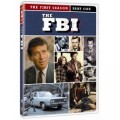| Reviews & Columns |
|
Reviews DVD TV on DVD Blu-ray 4K UHD International DVDs In Theaters Reviews by Studio Video Games Features Collector Series DVDs Easter Egg Database Interviews DVD Talk Radio Feature Articles Columns Anime Talk DVD Savant Horror DVDs The M.O.D. Squad Art House HD Talk Silent DVD
|
DVD Talk Forum |
|
|
| Resources |
|
DVD Price Search Customer Service #'s RCE Info Links |
|
Columns
|
|
|
FBI: The First Season, Part One, The
Solid, entertaining storytelling, beautifully produced. Warner Bros.' indispensable Archive Collection of M.O.D. (manufactured on demand) discs rescues another essential title from the lost pages of television's past with The F.B.I.: The First Season, Part One, a 4-disc, 16-episode collection that gathers together the first half of this Quinn Martin production's premiere 1965 season. Grumblings aside about this release's split season selection, The F.B.I. has all the hallmarks of classic 1960s television drama: lean, carefully-structured scripts, efficient, no-nonsense direction, a charismatic lead performance by Efrem Zimbalist, Jr., matchless casting with Hollywood's best supporting players, and production values that rivaled TV's big-screen counterparts at the time. No extras with this set, and the original materials used for the transfers here are just beginning to go south...but necessary viewing for anyone interested in this time period and genre.
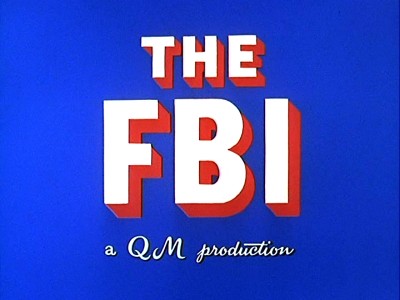
Washington, D.C., 1965...where gas is 30 cents a gallon. In a small, tidy, spartan one-bedroom apartment, FBI Inspector Lewis Erskine (Efrem Zimbalist, Jr.) readies himself for bed after a long day of work...right before the phone rings. On the line is Arthur Ward (Philip Abbott), Assistant Director of the Federal Bureau of Investigation (second only to the Director, J. Edgar Hoover). Whatever rest Erskine planed on getting, he better get it on the next plane out of D.C., because he's been given another assignment. As his superior Ward has often stated, Erskine gets some leeway from the Director because he gets results...but when duty calls, it doesn't matter if its night or day, Erskine must go. Investigating federal crimes ranging from interstate fugitives to saboteurs to embezzlers to pornographers to check frauds, Erskine is often paired with Special Agent Jim Rhodes (Stephen Brooks), a young, slightly cocky agent who often sparks with Erskine not so much because of his work relationship, but rather because he is dating widower Erskine's daughter, Barbara (Lynn Loring). Scrupulously avoiding any relationships with the various women he encounters during his investigations, Erskine grimly goes about his work protecting the United States from its enemies within.
SPOILER WARNINGS
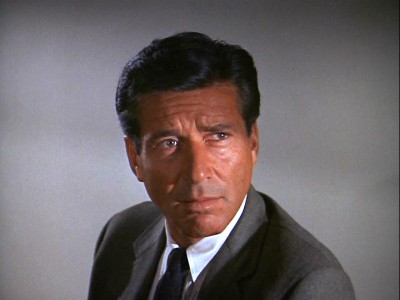
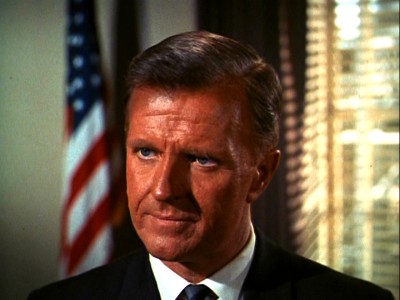
I'll always remember The F.B.I. not only for its stirring, martial opening theme music blast from composer Bronislau Kaper, but also because, when I was growing up, it proved to be a reliable source of contention between my father and I on Sunday nights. You see, The F.B.I. was on at 8:00pm on ABC, and it was one of my old man's favorite shows (he loved anything showing punks and criminals getting theirs). I liked it a lot, too, don't get me wrong...but the hour-long Walt Disney's Wonderful World of Color started earlier at 7:30 over on NBC, and I couldn't stand to watch a show half-way through, only to quit...or indeed come in on a show when it was already half over (which always happened with The F.B.I.). If I whined enough and begged my mom to intercede, I'd get to watch most of the new Walt Disneys (with the old man swearing up a storm in the background), but with reruns and summer repeats, Dad got the whole F.B.I. shebang. Such was fate in the dark, stormy days of one-TV families in the early 1970s.
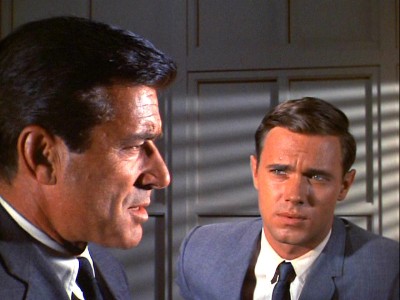
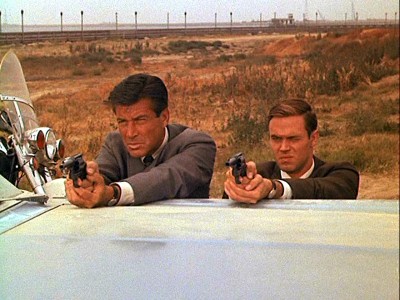
I know I haven't seen The F.B.I. since it went off the air in 1974, after a considerable nine-year run (legendary producer Quinn Martin's longest production). Traditionally (at least back in pre-cable days), hour-long dramas, even of the adventurous kind, didn't do well in syndication, so if it aired for a time after '74, I didn't see it in my small TV market. However, watching it now, its pleasures are marvelously predictable. With the big-screen bio of J. Edgar Hoover coming up, I'm sure there might be some who will look at a series like The F.B.I. as a source of amusement or scorn, considering not only the series' square, traditional message (the F.B.I. is an unfailing force for good in an America that deals with its problems in a forthright, honest, and remarkably fast manner), but also since, according to some sources, the real F.B.I. had some input in the series, including casting choices and script approval. While I have no problem with the series' message (it's no more simplistic―and very probably closer to the truth―than the hard-left's opposing viewpoint that paints America as a cesspool of problems, with the F.B.I. as one of its biggest), I do have to crack up when I read the shrill outcry about the F.B.I.'s involvement with the casting of a television show. That may not be an ideal situation, or a desirable one, for that matter...but it is, after all, just a TV show, and such political and ideological constraints exist in most human endeavors, inside and outside the government sphere―with far more debilitating effect (just to stay within the entertainment industry for an example: try being a conservative attempting to break into Hollywood today...hope you have bus fare back home).
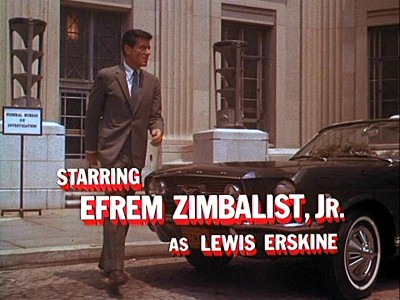
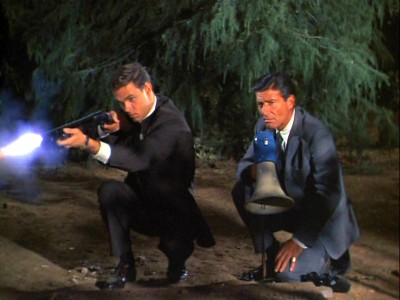
Outside of the predictable, facile jabs that come from the same tired corners at a series like The F.B.I., if one loves storytelling at its most basic and most accomplished, it's easy to set aside any phony notions of political outrage. Because that's precisely the appeal The F.B.I. has: A-B-C storytelling, done with assurance and brio. I find it rather appealing that in 1965, when the world was exploding with globe-hopping Bondmania, along comes a traditional investigative series that dealt with criminals strictly within the boundaries of the U.S., from small-fry boosters to Commie subversives bent on destroying America from within. Dispensing with all suspense over "whodunit" by showing the criminal committing his act in the pre-credit sequence, The F.B.I. concentrates almost exclusively on procedure, showing the painstaking process of Erskine tracking down his prey, coldly, efficiently...and usually without much emotion. This procedural emphasis doesn't reach the level of kabuki-like fetish, such as that genuine masterpiece, Dragnet, but The F.B.I. is relentless in its own way, sticking to the case, with elements such as possible romantic interludes with the handsome Zimbalist, Jr., kept strictly to the sidelines. Humor is also negated; Erskine and Rhodes may laugh grimly at their low pay and hard hours, but it's infrequently, and it's not meant to make the audience laugh. And romance, such as it is, is ditched early in the series when the producers drop Erskine's daughter, Barbara, and her limp romance with Rhodes (thankfully, too, since it was going nowhere). As for Erskine's love life, forget it―he doesn't have time. And even if he did, there's a Bureau rule: no relationships with anyone met on the job (I also love how circumspect and reserved they are with victims; the extent of their empathy is to politely excuse themselves when the crying starts). And even if he could do that, he doesn't want another woman to die because of his job (as his wife did, catching a bullet meant for him). We see pretty Lee Meriwether, working down in photos, as a potential girlfriend...but then she disappears, showing up anonymously in a few more episodes. If a long-term relationship is in the cards for the work-obsessed Erskine, it hasn't happened yet (again...this is why I can't stand split-season releases).
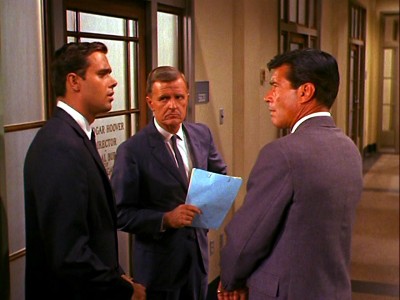
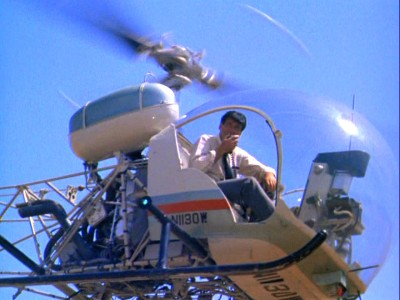
Erskine's job becomes his whole life, and living it according to the Bureau requirements trumps all other considerations. Even though he's given a hard time by his superior, who demands constant excellence or else (it's interesting how many times his boss threatens relieving him if he can't cut a particular assignment), he chooses the Bureau over women like the lovely Dina Merrill (in The Monster, Merrill, hoping for a different answer, fishes with, "Are you telling me you care about what happens to me?" to which Erskine, with a totally straight face, responds, "I care what happens to every citizen."), and job offers in civilian life that pay a relative fortune. Clearly, this idealistic view of a typical F.B.I. agent could be traced to Hoover's desire for The F.B.I. to be, in part, a positive P.R. job for the Bureau (no different than Webb's desire for Dragnet to function the same way for his beloved L.A.P.D.), but I'd like to think there were―and are―agents like Erskine who devote their lives to excelling at a difficult-to-say-the-least job, while maintaining the highest standards in their personal lives, as well (romanticism to be sure...but wishing for it to be true doesn't hurt the viewing experience).
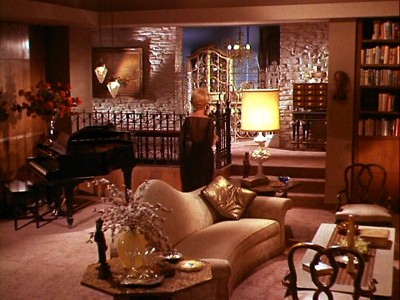
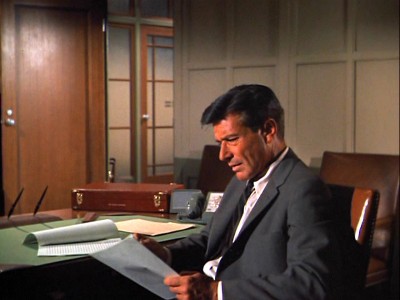
Special note should be given to producer Quinn Martin's production here. It shouldn't be surprising to me at this point, but here's another sixties series that looks like a mini theatrical movie each and every episode. I recently had the wonderful experience of interviewing Mr. Zimbalist, Jr. for the release of this series (and a more gracious, interesting interviewee I haven't encountered), and he flatly stated that Martin was the best producer in Hollywood, where he was willing to spend lavishly if it showed up on the screen (and if it didn't, Mr. Zimbalist said he wouldn't spend a nickel). And that's certainly true here in The F.B.I.. Location work is varied and quite interesting (even if some of those Eastern and Midwest locations look suspiciously like Southern California), while the interior sets sport set dressings that look feature film-worthy. Another Quinn Martin hallmark Mr. Zimbalist mentioned was his attention to good casting, and that, too, is immediately evident here in these first 16 episodes. Actors including Jeffrey Hunter, Estelle Winwood, Dina Merrill, Jack Klugman, Brett Somers, Robert Blake, Alejandro Rey, R.G. Armstrong, Noam Pitlik, Dabney Coleman, Peter Deuel, James Gregory, Harold Gould, Eileen Heckart, Jason Evers, Mark Richman, Miiko Taka, Edward Andrews, Susan Oliver, James B. Sikking, Lin McCarthy, Robert Duvall, Burt Reynolds, Norman Fell, James Farentino, Ted Knight, Beau Bridges, Claude Akins, Paul Fix, Bruce Dern, Leslie Nielsen, Cecil Kellaway, John McIntire, Arthur O'Connell, Louise Latham, Ian Wolfe, Harry Townes, and John Anderson pop up with substantial turns, giving The F.B.I. a heft of performance that is remarkable.
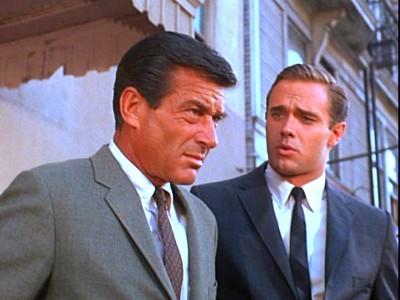
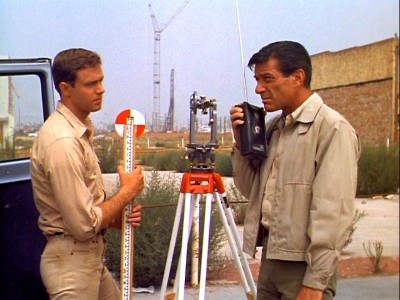
The F.B.I. had only one time slot―8:00pm on Sunday nights―for eight of its nine seasons (and only changed to 7:30pm its last year), with this consistency building a loyal audience who never had to search around the dial for the series. During this premiere 1965 season, The F.B.I. didn't crack the Nielsen Top Thirty, but it did help to lower its heavy competition's rating over on NBC, pushing Walt Disney's Wonderful World of Color down from 11th the previous year to 17th. Direct competition over on CBS stayed relatively stable, with The Ed Sullivan Show dropping two slots to 18th for the year. It would take a few years, but The F.B.I. would soon best both of these heavy-hitters.
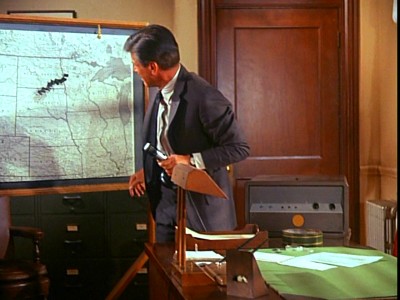
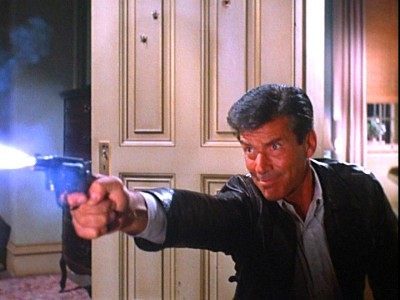
Here are the 16 episodes of the 4-disc collection, The F.B.I.: The First Season, Part One:
DISC ONE
The MonsterInspector Erskine and Agent Rhodes track down a serial killer who strangles his victims with their own long, beautiful hair.
Image in a Cracked Mirror
An embezzler's backstory hits a little too close to home for Inspector Erskine as he pursues the wily thief to the Mexican border.
A Mouthful of Dust
An Indian friend of Erskine's kills his wife's rapist, and escapes into the desert, where Erskine must follow.
Slow March Up a Steep Hill
Erskine's biggest problem isn't the bank robber he's trying to nap, nor the trouble he engenders with his boss when he rejects an obvious suspect; it's the fact that his daughter Barbara insists on marrying Jim Rhodes right now.
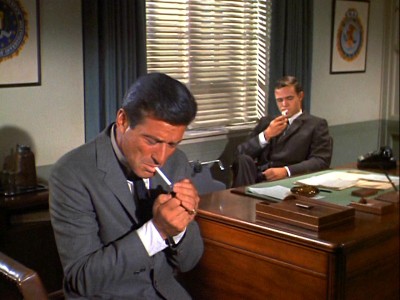
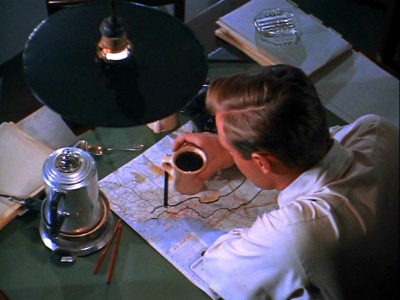
DISC TWO
The Insolents
The murder on a cruise ship, in international waters, challenges Rhodes' investigative procedures when he feels an unwelcome connection with the prime suspect.
To Free My Enemy
What is Erskine to do? Track down the kidnaping ring that has napped an elusive pornographer that has taunted Erskine...only to see him escape?
The Problem of the Honorable Wife
A clash of cultures deepens a tale of Communist-inspired sabotage in San Francisco, when a ex-soldier decides he wants to be "someone" to his Japanese-born wife.
Courage of a Conviction
A childhood friend of Erskine's, who has been a loyal informant for years, suddenly comes under suspicion when the agents use a junkie to track down a notorious forger.
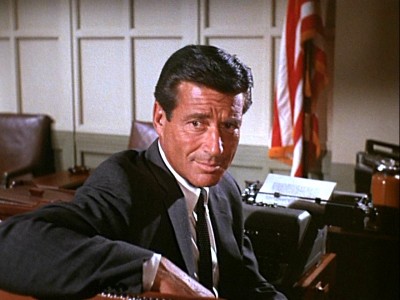
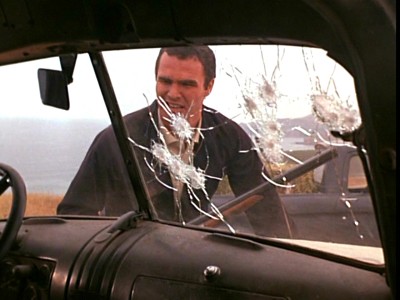
DISC THREE
The Exiles
Can Erskine infiltrate a group of South American expatriates, and not only uncover their spy but also stop a revolution?
The Giant Killer
Another psycho who destroys in the name of peace. Erskine and Rhodes must track down a saboteur who's bent on blowing up a new experimental rocket.
All the Streets Are Silent
An ex-boxer turned cabbie is a crucial witness to a gang who is arming itself with stolen military weapons.
An Elephant Is Like a Rope
An amnesiac arrives at F.B.I. headquarters with a gunshot wound. It's up to Erskine to discover why the young man has almost a half a million dollars in cash on him.
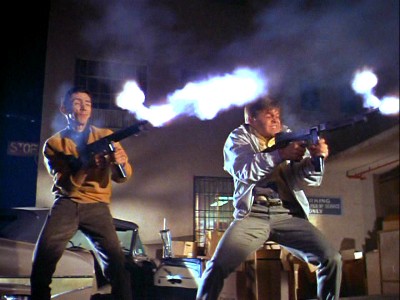
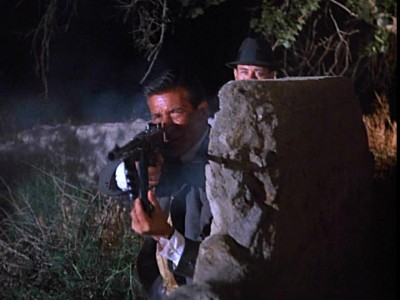
DISC FOUR
How to Murder an Iron Horse
Another psycho who's daddy didn't love him enough plots to destroy a passenger train.
Pound of Flesh
A military town is torn apart when Erskine refuses to believe that the obvious suspect in the murder of the military chaplain's wife, is innocent.
The Hijackers
Two challenges face Erskine in Milwaukee: a gang of truck thieves who have boosted a half a million dollars in furs...and Erskine's lonely uncle, who wants time Erskine can't give him.
The Forests of the Night
A severe drought brings out the barely-suppressed religious bigotry in a small Oregon town...but Erskine soon finds out it's not that simple of an explanation for a mysterious, devastating fire.
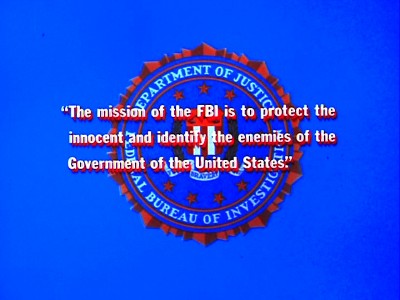
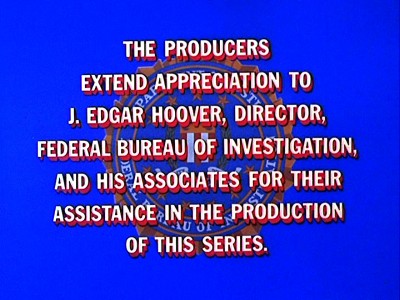
The DVD:
The Video:
Some of the original elements used for the full-screen, 1.33:1 video transfers for The F.B.I.: The First Season, Part One are just this side of going ruddy pinkish. They're not...but they're close. Real close. Image is sharp, and compression isn't a problem at all. Good overall, but not on a par with say, a vintage Paramount TV release.
The Audio:
The Dolby Digital English mono audio re-recording is strong and consistent, with minimal hiss. No close captions or subtitles.
The Extras:
No extras for The F.B.I.: The First Season, Part One (but you can read my interview with Efrem Zimbalist, Jr. here).
Final Thoughts:
Exciting, straightforward storytelling. Producer Quinn Martin comes up with his longest-running series with The F.B.I., where handsome, focused Efrem Zimbalist, Jr. battles Commie infiltrator and two-bit check forgers with equal professionalism. Beautiful production design and supporting casts from heaven make these 16 episodes essential viewing for vintage TV fans and lovers of the crime meller genre. I highly, highly recommend The F.B.I.: The First Season, Part One.
Paul Mavis is an internationally published film and television historian, a member of the Online Film Critics Society, and the author of The Espionage Filmography.


|
| Popular Reviews |
| Sponsored Links |
|
|
| Sponsored Links |
|
|
| Release List | Reviews | Shop | Newsletter | Forum | DVD Giveaways | Blu-Ray | Advertise |
|
Copyright 2024 DVDTalk.com All Rights Reserved. Legal Info, Privacy Policy, Terms of Use,
Manage Preferences,
Your Privacy Choices | |||||||









